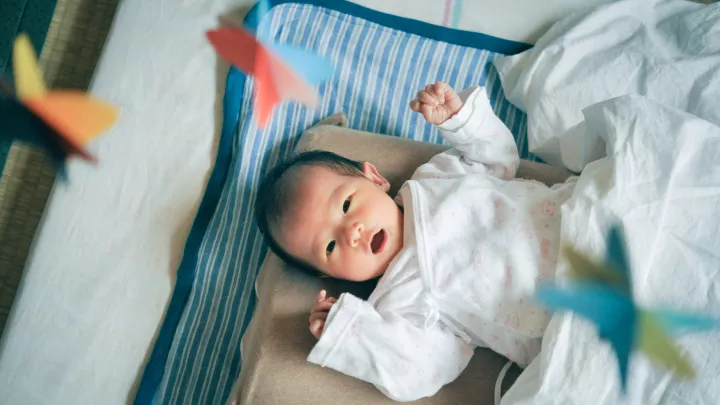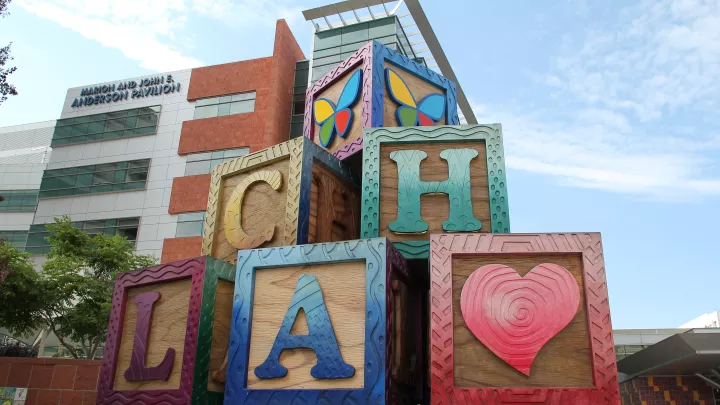Neuromuscular Disorders Center
Whether your child has a suspected or confirmed neuromuscular disorder diagnosis, experts at Children’s Hospital Los Angeles can help. Our Neuromuscular Disorders Center offers convenient access to a level of care that’s not widely available. We use a team approach to tailor therapies to your child’s unique needs.
Neuromuscular Disorders Center: Why Choose Us
At Children’s Hospital, we provide:
- Specialized training and targeted treatments: Our neuromuscular experts include Board-certified pediatric neurologists with an added qualification in child neurology and neuromuscular medicine or clinical neurophysiology. In addition to specialized training, our physicians have years of experience.
- Interdisciplinary approach: Our team also includes Orthopedic Surgery, Pulmonology, Cardiology, Endocrinology, Physical Therapy, Occupational Therapy, Social Work, nurse care management, and a registered dietitian. All of our specialists also have expertise and experience specifically with neuromuscular disorders.
- National recognition: We are designated an MDA Care Center by the Muscular Dystrophy Association, and a Certified Duchenne Care Center by Parent Project Muscular Dystrophy (PPMD). This niche expertise means our clinicians can provide more targeted, individualized care that leads to better outcomes.
- Excellent results in surgical outcomes: Children with neuromuscular disorders are complex. If surgery is necessary, many community surgeons are hesitant to perform surgery on this population. Because of our team approach, children at our Neuromuscular Disorders Center benefit from exceptionally low surgical complication rates. For example, our patients who have scoliosis surgery (common for children with neuromuscular disorders) experience some of the lowest infection rates in the nation. Our specialists use advanced techniques that optimize each child’s outcome.
- Personalized therapies: Our physicians build relationships with their patients and parents. Their multidisciplinary approach allows them to care for the whole child and empower families to have the best possible quality of life. Find out what to expect at your first appointment with our Center.
Easy-to-Access Care for Muscular Dystrophy in Children
Once a year, children with neuromuscular disorders and their families meet with our core group of specialists. Each subspecialist dedicates an entire clinic appointment to this annual assessment. Schedules are posted in the patient rooms so that patients and their families know exacly who they will see and what time to expect the medical care provider. This model means you can easily get most if not all of the annual care your child needs without worrying about coordinating subspecialty appointments.
Families traveling long distances can schedule annual evaluations, such as pulmonary function or cardiac tests, on the same day as their clinic appointments. Our Center has even served as a model for other multidisciplinary clinics throughout the hospital.
What Are Neuromuscular Disorders?
In order for us to move, our brain sends signals to the rest of the body via the spinal cord, nerves and muscles. To feel, signals are sent from the body to nerves, the spinal cord and then to the brain to interpret. Neuromuscular disorders affect nerves, muscles, where the nerves and muscles communicate (called the neuromuscular junction), and the anterior horn cell (where the motor nerves originate). These disorders can also affect other organ systems in the body.
Symptoms of neuromuscular disorders in children
Muscle loss or weakness is the most common sign of a neuromuscular disorder. Children with neuromuscular disorders may experience:
- Weakness
- Frequent falls
- Difficulty getting up from a seated position on the floor
- Difficulty climbing stairs
- Deformities of the feet or toes
- Drooping eyelids
- Swallowing difficulties
- Tiring easily
- Toe walking
Multidisciplinary, Collaborative Care
Your visit to the multidisciplinary Neuromuscular Disorders Center may include collaboration among multiple experts, including:
- Cardiology
- Orthopedics
- Physical Therapy
- Occupational Therapy
- Pulmonology and Sleep Medicine
- Social Work
- Nurse care management
- Dietitians
After the multidisciplinary clinic visit concludes, our team meets to discuss the findings of the day and draft a comprehensive plan of care.
Orthopedics is involved with nearly all of the patients we see in the Neuromuscular Disorders Center. Orthopedic appointments are usually on separate days in the Orthopedic Outpatient Clinic at CHLA.
Your child may also need separate appointments with specialists in:
Certifications and Recognitions for Neuromuscular Care Excellence
Multiple organizations recognize our Center as a leader in neuromuscular care. These certifications and recognitions show our commitment to the highest-quality, most effective care.
CHLA was the first center in Southern California and among the first centers nationwide to receive certification from Parent Project Muscular Dystrophy (PPMD).
We are also recognized as a:
- California Children’s Services Special Care Center
- MDA Care Center
- Partners in Myasthenia Gravis Care provider
- Spinal Muscular Atrophy (SMA) Newborn Screening and Treatment Center for the State of California
Conditions We Treat
Our neuromuscular specialists manage and treat a range of neuromuscular conditions in children, including:
- Duchenne muscular dystrophy
- Spinal muscular atrophy
- Becker muscular dystrophy
- Limb-girdle muscular dystrophy
- Facio-scapulo-humeral muscular dystrophy
- Bethlem and Ulrich myopathy/muscular dystrophy
- Merosin deficient muscular dystrophy
- Congenital muscular dystrophy
- Titin associated myopathy/muscular dystrophy
- Myotonic dystrophy
- Myotonia congenita
- Paramyotonia congenita
- Other mytonic disorders
- Autoimmune myasthenia gravis
- Acetylcholine receptor antibody positive
- Anti-MuSK positive
- Anti-LRP4 positive
- Seronegative autoimmune myasthenia gravis
- Congenital myasthenia syndromes
- Charcot-Marie-Tooth disorder and other hereditary neuropathies
- RYR-1 associated congenital myopathy
- Nemaline myopathies
- Other congenital myopathies
- Metabolic myopathy
- Autoimmune myopathy
- Chronic inflammatory demyelinating polyradiculoneuropathy
- Other autoimmune neuropathies
Find out more about neuromuscular disorder treatment.


